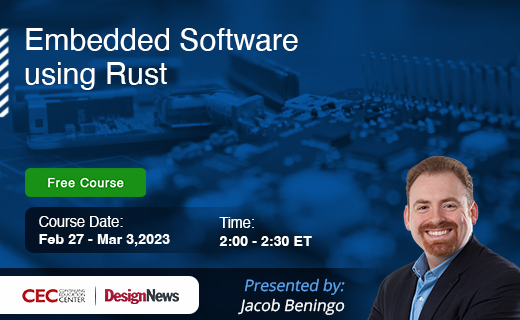Rust is a memory-safe systems programming language that can be used in embedded systems like IoT devices. In this course, you will learn how to use Rust to develop microcontroller-based embedded systems. You’ll also learn about Rust’s syntax, data types, and control flow. By the end of the course, you will have the skills to develop reliable, efficient, and easy to maintain embedded software using Rust. Additionally, you will learn about best practices for security, testing, and debugging.
Hardware used for this course include the STM32F3 Discovery Board.
Registration and Playback are located here (May require login to access)

February 27 – Day 1 – Introduction to Rust for Embedded Systems
Selecting the right embedded software language is no longer as simple as just choosing C or C++. Rust, a memory-safe programming language offers an interesting use case to help businesses develop reusable, scalable, and higher quality software. In the session, we are going to explore Rust, its capabilities, and how it fits into embedded software development.
February 28 – Day 2 – “Hello Rust!”, using QEMU
Before writing an application for hardware, it’s helpful to learn a language and the process using emulation. In this session, we will explore how to create a project, leverage Rusts cargo tools, and write a Rust application for the Arm Cortex®-M processor. Attendees will walk away understanding how to run an emulated Rust application and debug it using GDB.
March 1 – Day 3 – “Hello Rust!”, using the STM32F3
With the understanding learned from using QEMU, we are now ready to deploy an application to hardware. In this session, we will deploy our first application to the STM32F3 Discovery board and debug it. In addition, we will learn about memory mapping registers using the microarchitecture, peripheral access (PAC), and HAL crates. Attendees will walk away understanding the fundamentals of memory-mapping registers.
March 2 – Day 4 – Interfacing to Peripherals in Rust
A common activity in many embedded applications is to interface with the microcontroller’s peripherals. In this session, we will examine the differences between interfacing with an mcu’s registers in C and Rust. Attendees will learn about important Rust keywords, wrappers, exceptions, and more.
March 3 – Day 5 – Becoming a Rust Expert
Rust is a complex language, one that will take time and effort to master, especially for embedded systems. In this session, we will explore some concepts in portability and concurrency, before discussing resources to help attendees master Rust.
Course Resources
Jacob’s General Embedded Software Resources
- Sign-Up for the Embedded Bytes Newsletter here
- Developing Reusable Firmware – A Practical Guide to API’s, HAL’s and Drivers here
- MicroPython Projects Book here
- Jacob’s YouTube Channel – here





